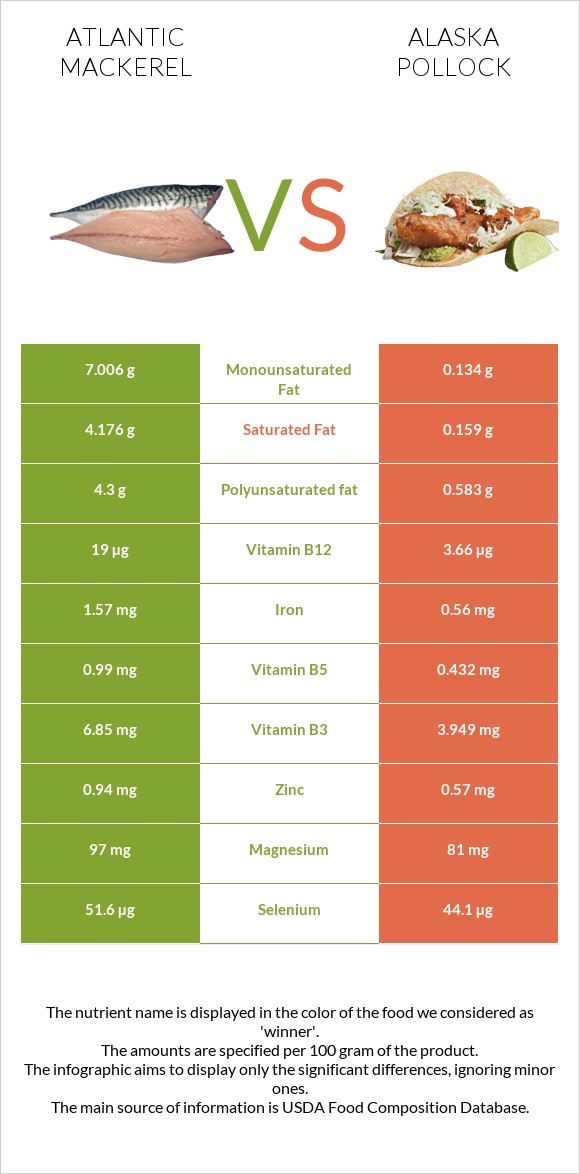Atlantic Mackerel vs. Pollock — In-Depth Nutrition Comparison
Compare
Summary of differences between atlantic Mackerel and pollock
- Atlantic Mackerel has more vitamin B12, vitamin D, vitamin B3, iron, vitamin B1, vitamin B5, and vitamin E; however, pollock is higher in phosphorus.
- Atlantic Mackerel covers your daily need for vitamin B12, 210% more than pollock.
- Atlantic Mackerel has 20 times more saturated fat than pollock. While atlantic Mackerel has 3.257g of saturated fat, pollock has only 0.159g.
These are the specific foods used in this comparison Fish, mackerel, Atlantic, raw and Fish, pollock, Alaska, cooked, dry heat (may have been previously frozen).
Infographic

Infographic link
Mineral Comparison
Mineral comparison score is based on the number of minerals by which one or the other food is richer. The "coverage" charts below show how much of the daily needs can be covered by 300 grams of the food.
| Contains more IronIron | +191.1% |
| Contains more CopperCopper | +21.7% |
| Contains less SodiumSodium | -78.5% |
| Contains more CalciumCalcium | +500% |
| Contains more PotassiumPotassium | +36.9% |
| Contains more PhosphorusPhosphorus | +23% |
| Contains more ManganeseManganese | +20% |
Vitamin Comparison
Vitamin comparison score is based on the number of vitamins by which one or the other food is richer. The "coverage" charts below show how much of the daily needs can be covered by 300 grams of the food.
| Contains more Vitamin CVitamin C | +∞% |
| Contains more Vitamin AVitamin A | +194.1% |
| Contains more Vitamin EVitamin E | +442.9% |
| Contains more Vitamin DVitamin D | +1138.5% |
| Contains more Vitamin B1Vitamin B1 | +225.9% |
| Contains more Vitamin B2Vitamin B2 | +39.9% |
| Contains more Vitamin B3Vitamin B3 | +129.9% |
| Contains more Vitamin B5Vitamin B5 | +98.1% |
| Contains more Vitamin B6Vitamin B6 | +21.3% |
| Contains more Vitamin B12Vitamin B12 | +138% |
| Contains more Vitamin KVitamin K | +4900% |
| Contains more FolateFolate | +200% |
All nutrients comparison - raw data values
| Nutrient |  |
 |
DV% diff. |
| Vitamin B12 | 8.71µg | 3.66µg | 210% |
| Vitamin D | 643 IU | 51 IU | 74% |
| Vitamin D | 16.1µg | 1.3µg | 74% |
| Vitamin B3 | 9.08mg | 3.949mg | 32% |
| Fats | 13.89g | 1.18g | 20% |
| Polyunsaturated fat | 3.35g | 0.583g | 18% |
| Sodium | 90mg | 419mg | 14% |
| Saturated fat | 3.257g | 0.159g | 14% |
| Iron | 1.63mg | 0.56mg | 13% |
| Monounsaturated fat | 5.456g | 0.134g | 13% |
| Protein | 18.6g | 23.48g | 10% |
| Vitamin B1 | 0.176mg | 0.054mg | 10% |
| Vitamin E | 1.52mg | 0.28mg | 8% |
| Vitamin B5 | 0.856mg | 0.432mg | 8% |
| Phosphorus | 217mg | 267mg | 7% |
| Vitamin B2 | 0.312mg | 0.223mg | 7% |
| Calcium | 12mg | 72mg | 6% |
| Calories | 205kcal | 111kcal | 5% |
| Cholesterol | 70mg | 86mg | 5% |
| Vitamin B6 | 0.399mg | 0.329mg | 5% |
| Choline | 65mg | 91.6mg | 5% |
| Vitamin A | 50µg | 17µg | 4% |
| Vitamin K | 5µg | 0.1µg | 4% |
| Potassium | 314mg | 430mg | 3% |
| Magnesium | 76mg | 81mg | 1% |
| Copper | 0.073mg | 0.06mg | 1% |
| Zinc | 0.63mg | 0.57mg | 1% |
| Folate | 1µg | 3µg | 1% |
| Vitamin C | 0.4mg | 0mg | 0% |
| Manganese | 0.015mg | 0.018mg | 0% |
| Selenium | 44.1µg | 44.1µg | 0% |
| Tryptophan | 0.208mg | 0.263mg | 0% |
| Threonine | 0.815mg | 1.029mg | 0% |
| Isoleucine | 0.857mg | 1.082mg | 0% |
| Leucine | 1.512mg | 1.908mg | 0% |
| Lysine | 1.708mg | 2.157mg | 0% |
| Methionine | 0.551mg | 0.696mg | 0% |
| Phenylalanine | 0.726mg | 0.917mg | 0% |
| Valine | 0.958mg | 1.21mg | 0% |
| Histidine | 0.548mg | 0.691mg | 0% |
| Omega-3 - EPA | 0.898g | 0.086g | N/A |
| Omega-3 - DHA | 1.401g | 0.423g | N/A |
| Omega-3 - DPA | 0.212g | 0.027g | N/A |
Macronutrient Comparison
Macronutrient breakdown side-by-side comparison
Protein:
18.6 g
Fats:
13.89 g
Carbs:
0 g
Water:
63.55 g
Other:
3.96 g
Protein:
23.48 g
Fats:
1.18 g
Carbs:
0 g
Water:
73.65 g
Other:
1.69 g
| Contains more FatsFats | +1077.1% |
| Contains more OtherOther | +134.3% |
| Contains more ProteinProtein | +26.2% |
| Contains more WaterWater | +15.9% |
~equal in
Carbs
~0g
Fat Type Comparison
Fat type breakdown side-by-side comparison
Saturated fat:
Sat. Fat
3.257 g
Monounsaturated fat:
Mono. Fat
5.456 g
Polyunsaturated fat:
Poly. Fat
3.35 g
Saturated fat:
Sat. Fat
0.159 g
Monounsaturated fat:
Mono. Fat
0.134 g
Polyunsaturated fat:
Poly. Fat
0.583 g
| Contains more Mono. FatMonounsaturated fat | +3971.6% |
| Contains more Poly. FatPolyunsaturated fat | +474.6% |
| Contains less Sat. FatSaturated fat | -95.1% |